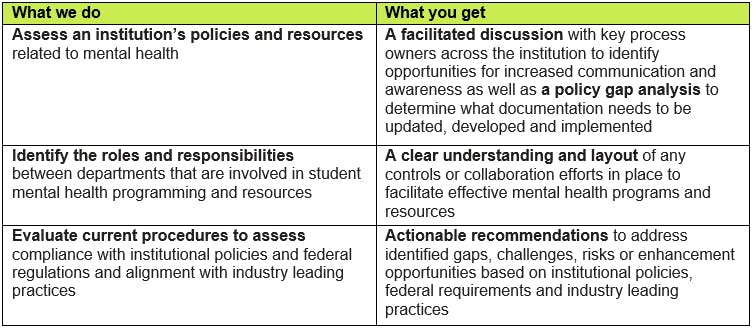

Internal audit approaches and considerations for auditing student mental health resources
Student wellness and mental health continue to be a top concern for higher education institutions. Students transitioning to an undergraduate or graduate education are inherently faced with increased financial, academic, social and other pressures. Additionally, there has been an overwhelming rise over the last several years in the reporting of mental health crises and concerns – by students, faculty, staff and in the news – due in part to the COVID-19 pandemic (e.g., remote learning/work, isolation, quarantines, vaccination requirements, etc.), social injustices across the national and political unrest. Moreover, the reporting surge in some instances is simply a result of the increased awareness around the topic of mental health, the expectations for the proper resources on campus and the critical need for institutions to help students. Given the escalation in reporting and the continued demand for more resources, higher education institutions should be prepared to provide the programs, professionals and tools needed to their campus communities to support student success and institutional growth.
To provide an impactful experience, colleges and universities must be equipped to handle the needs and requests of their students. Education is the primary function and responsibility of higher education institutions; however a second priority is related to personal and social responsibilities. Utilizing an internal audit function to evaluate the current state of mental health resources will ease the burden on the institution’s resources.
Internal audit process
The first step internal audit will take to determine if an institution is prepared to meet student mental health and wellness needs and demands is to evaluate what programs, if any, are already in place. Internal audit will take an objective view of what resources exists and where there are gaps or opportunities to do more. This includes looking at educational programming, training requirements, monitoring of student incidents, response procedures and effectiveness, proper communication mechanisms and policies and procedures that are formal, consistent and transparent.
Institutions that are not proactive in their approach to mental health risk suffering on operational, reputational and potentially, financial levels. Having a sound mental health support framework and programs in place will help mitigate those risks and potential damages, and most importantly, aid students in distress. Likewise, even with programs and resources in place, institutions must regularly evaluate their utilization and effectiveness.
Baker Tilly can help
Our specialized higher education internal audit team can help institutions evaluate the current state of their mental health programs and resources. Our assessment will assist in identifying opportunities for improvement, developing recommendations and providing guidance to create actionable steps to address areas of concern or improvement.
For more information, or to learn more about how we can help your institution, contact our team.


